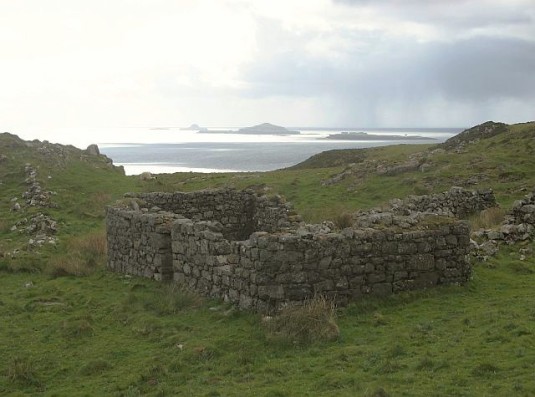
Ruins at Cracaig, Isle of Mull. Eileen Henderson [CC BY-SA 2.0 (http://creativecommons.org/licenses/by-sa/2.0)%5D, via Wikimedia Commons
We all like a good ghost story, don’t we? Apparitions, manifestations, visitations – the presence of the dead can bring a story to life. Dickens’ A Christmas Carol may be on one level a heartwarming if cheesy tale of triumph against adversity, and the value of family and generosity (and it probably wasn’t so cheesy in Dickens’ day – indeed, he’s possibly to blame for putting much of the cheese into Christmas) but let’s face it, it’s the ghosts that get all the action. Having your faults pointed out by a nagging spouse leads to a soap opera, or maybe a domestic violence story, but when you’re accosted by your dead partner (Dickens), or the unseelie spectre of your own guilty conscience (Edgar Allen Poe’s The Telltale Heart), that’s much more gripping.
So, I thought I’d share some of my favourite ghost stories with you.
1. The Jewel of Seven Stars, by Bram Stoker.
Bram Stoker famously wrote Dracula, but he also wrote a number of other novels that can only be described as Gothic. The Jewel of Seven Stars is my favourite. I first read it aged around 13, at a time when I was fascinated by Ancient Egypt, and the book made such an impression that I gave it a cameo in my novel The Book of Lismore. In Stoker’s story a young Victorian doctor is drawn into the affairs of an archaeologist and his beautiful daughter, who may, or may not, be the reincarnation of the female Pharaoh Tera. The book is full of great horror devices, including a severed hand that crawls around killing people, and we know that when man meddles in affairs of the supernatural it’s bound to end badly. And so it does. Watch out for your ending, though. After publication, there was an alternative version released which has a bizarrely unconvincing ‘happy’ ending. Get the original.
2. The Lovely Bones, by Alice Sebold.
I hated this book. I’m not joking – I hated it, and I never want to read it again. Here, it’s the ghost who tells her own story – not just a flashback narrative, but an insightful telling in which the ghost of a murdered girl watches while the effects of her death wreak enormous damage on her family. There’s a not entirely unhappy ending and a sense of redemption, but the overwhelming impression I was left with was hand-over-the-mouth ghastliness communicated through finely crafted words. That’s some powerful writing. Read it once.
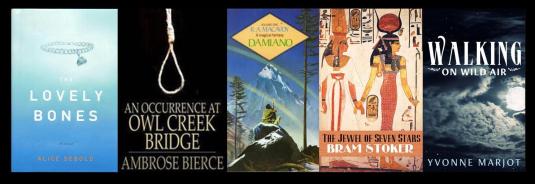
3. Macchiata in the Damiano books by R A MacAvoy
I’m very fond of the Damiano trilogy. There’s a glimpse of Middle Ages Europe, a flavour of the great events of the day (including war and plague), and a very real sense of magic. Dreamy Damiano’s Dad is a sorcerer, but Damiano longs to be a musician. He’s off to a good start – his lute teacher is the Archangel Raphael – but somehow life keeps getting in the way. Before long, his father is dead, his town overrun with soldiers, and his beloved muse (and her annoyingly protective older brother) have fled, along with the rest of the population. Damiano’s own magic is more a hindrance than a help as he sets out on the refugee’s road along with his talking dog: fat, short-legged Macchiata (Italian for ‘Spot’). I won’t give away the circumstance of Macchiata’s death, in case you want to read the book, but she carries on commenting on her Master’s circumstances from the shelter of Raphael’s robe (no, she won’t tell you what he wears underneath it).
“I bit them both, Master!” she panted, exultant. “I bit both soldiers and old Marco, too! Three in one day.” Suddenly she came to a stop, turned, and threw herself, slobbering, upon her winded master. “Oh Master, I have never been so happy! This war is wonderful.”
4. An Occurrence at Owl Creek Bridge by Ambrose Bierce
I read this short story when I was still at school, and it’s another that has stuck with me. It’s the narrative of a Confederate sympathiser, Peyton Farquhar, who is hanged by Union troops during the American Civil War. As the trapdoor opens the rope breaks and Farquhar is free to scramble away. He begins to make his way back home. The narrative is confused and rambling, skipping through time, and it’s considered to be an early example of ‘stream of consciousness’. We learn a lot about Farquhar’s life and the circumstances of his capture, but as the story unfolds it becomes more and more apparent that there’s something wrong with his recollections, and the tale ends with a twist. What makes this a ghost story? You’ll have to read it to find out.
5. Dougie MacLean in Walking on Wild Air
Walking on Wild Air is my first full-length ghost story. It’s early days in my writing career, but so far he’s my favourite character. To all appearances, he’s a man in early middle age, friendly and likeable, nothing out of the ordinary. He roams the hills with his dog, recapitulating the life he once led, as a shepherd, back in the early part of the twentieth century. So far, so ordinary, but Sushila Mackenzie is the only person who can see him.
As the story unfolds we begin to learn what is special about Sushila, and she finds herself falling in love with someone who may not even be human. There is far more to Dougie than meets the eye, and I’ve enjoyed the challenge of providing just enough information to make him interesting without revealing all his secrets. I hope you like him as much as I do.
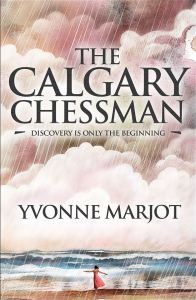

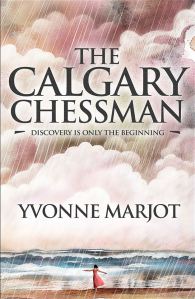
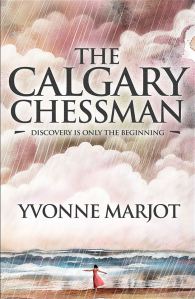

Recent Comments